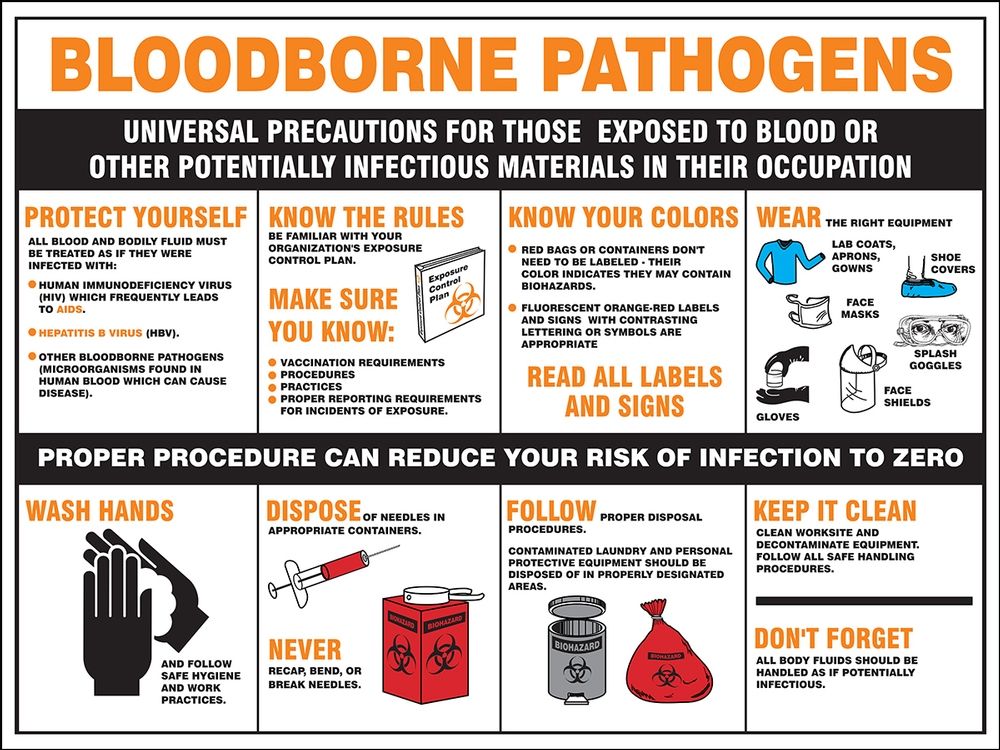Exposure Control Plan

BOARD POLICY 8453 - DIRECT CONTACT COMMUNICABLE DISEASES
The Board of Education seeks to provide a safe educational environment for students and staff. This can best be accomplished by assuring that all persons with the school community understand the method of transmission and prevention of diseases that are not contracted through air-borne pathogens, but rather, through direct contact with body fluids and excretions, especially blood, vomit, feces, or urine. The Board is also committed to assuring the confidential status of individuals who may have been diagnosed with a blood-borne communicable disease.
For purposes of this policy, these diseases shall include:
With this in mind, the Board directs the Superintendent to develop programs for students and staff for the purpose of understanding the manner in which these diseases may be prevented and how they are transmitted. These programs should specify, the risk factors involved, how to deal with those risks, and emphasize the fact that these diseases are preventable if basic precautions are taken.
The Board further directs the Superintendent to assure that students or staff who reveal the fact they have contracted one of these diseases will have their status safeguarded in accordance with Federal and State statutes dealing with confidentiality and that their civil rights will be respected. Staff members will have access to District leave policies in accordance with Board policy and negotiated agreement and opportunities for reasonable accommodation as described by the Americans with Disabilities Act. Should a student be unable to attend school as a result of illness, an alternative education program shall be provided in accordance with the Board's policy and administrative guidelines dealing with Homebound Instruction.
Additionally, the Board directs the Superintendent to develop an educational program in accordance with Michigan law that will ensure proper instruction of guidance counselors, nurses (need not be included if a "licensed health care professional"), teachers, and other school personnel who teach students about HIV and AIDS. Such a program shall include information about:
M.C.L.A. 380.1169
For purposes of this policy, these diseases shall include:
- HIV (human immunodeficiency virus);
- AIDS (acquired immune deficiency syndrome);
- AIDS related complex (condition);
- HAV, HBV, HCV (Hepatitis A, B, C);
- other disease that may be specified by the State Department of Health as contact communicable diseases.
With this in mind, the Board directs the Superintendent to develop programs for students and staff for the purpose of understanding the manner in which these diseases may be prevented and how they are transmitted. These programs should specify, the risk factors involved, how to deal with those risks, and emphasize the fact that these diseases are preventable if basic precautions are taken.
The Board further directs the Superintendent to assure that students or staff who reveal the fact they have contracted one of these diseases will have their status safeguarded in accordance with Federal and State statutes dealing with confidentiality and that their civil rights will be respected. Staff members will have access to District leave policies in accordance with Board policy and negotiated agreement and opportunities for reasonable accommodation as described by the Americans with Disabilities Act. Should a student be unable to attend school as a result of illness, an alternative education program shall be provided in accordance with the Board's policy and administrative guidelines dealing with Homebound Instruction.
Additionally, the Board directs the Superintendent to develop an educational program in accordance with Michigan law that will ensure proper instruction of guidance counselors, nurses (need not be included if a "licensed health care professional"), teachers, and other school personnel who teach students about HIV and AIDS. Such a program shall include information about:
- the nature of the disease;
- its causes and effects;
- the means of detecting it and preventing its transmission;
- the availability of appropriate sources of counseling and referral; and
- any other information that is appropriate considering the age and grade levels of students
M.C.L.A. 380.1169
